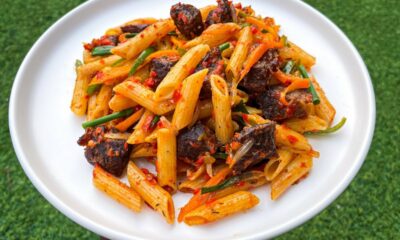News
A Cancer of Corruption steals Nigerian Oil, Weapons & Lives| Watch the PBS Documentary
We are saddened each time we watch or read investigative reports on Nigeria. While it may be easy to accuse the foreign press of misrepresenting our great nation, in some cases, they are spot on.
PBS is currently running a series a week-long series “Nigeria: Pain and Promise“.
The part of the series focuses on “How a cancer of corruption steals Nigerian oil, weapons and lives“
Synopsis
In Nigeria, where corruption is part of daily life, police officers routinely demand bribes, local government leaders pocket money meant for schools and the former national security advisor is accused of stealing billions from the military. As part of a week-long series “Nigeria: Pain and Promise,” special correspondent Nick Schifrin reports on the challenges of fighting corruption.
Below is the full transcript courtesy PBS
Click to visit their site
TRANSCRIPT
GWEN IFILL: We return again to our continuing series this week, “Nigeria: Pain and Promise.”
Tonight, special correspondent Nick Schifrin looks at corruption in the oil-rich nation, from allegations against the former government down to the police on the streets.
NICK SCHIFRIN: On the streets of Lagos, there is a saying: Every day is for the thief.
Godwin Ekpo’s thief was supposed to be his protector.
Do the police often ask for money?
GODWIN EKPO, Nigeria: They are still coming in Nigeria here, that police are taking money from people by force.
NICK SCHIFRIN: Godwin drove a taxi called a tricycle. Last month, the police officer stopped him to demand a bribe.
GODWIN EKPO: He requested for 2,000 naira.
NICK SCHIFRIN: That is about $10, what Godwin would have made working as a taxi driver that morning.
GODWIN EKPO: So, I say I’m coming from the church with my family.
NICK SCHIFRIN: He was with his wife and their three children. He refused to pay.
GODWIN EKPO: All of a sudden, I heard a gunshot twice. And now I went down, holding my jaw like this. And the blood was just gushing out.
NICK SCHIFRIN: So, the bullet came right through there?
GODWIN EKPO: Right through here.
NICK SCHIFRIN: The officer had shot him for refusing to pay $10.
GODWIN EKPO: What gave him the audacity to shoot the gun to innocent people? We were not robbers.
KEMI OKENYODO, Activist: The perception has been that the police is corrupt. You can abuse the rights of the average citizen.
NICK SCHIFRIN: Kemi Okenyodo studies police corruption. She says low salaries and a culture of impunity has led to this.
Videos on local media show police officers inside people’s cars demanding money.
MAN: Settle us. Give us the 10,000 naira.
GODWIN EKPO: The officer exhibits no shame. His victims reveal no surprise.
MAN: This is the number of the ATM. This is the code.
MAN: I don’t have 2,000 naira. I don’t have more than 2,000.
NICK SCHIFRIN: In Nigeria, this is daily life.
For some, when the person asking for money has a club or a gun, bribes are more like ransoms.
KEMI OKENYODO: The low-level corruption makes it worse, when you come in contact with police officers, when you go and report a case, and a case can easily be turned against the person that has come to report.
NICK SCHIFRIN: In Nigeria, the corruption is, sadly, everywhere. Shopkeepers here say police preside over a market for fake medicine. I have been asked for bribes by police officers, by soldiers, by airport security officers behind the X-ray machine. In Nigeria, the cancer of corruption has been spreading for years.
Often, it starts in childhood. The Kuletu school in Bauchi state looks like many rural Nigerian schools. This is the second grade classroom. No desks. No chairs. No pencils. No books.
MUSA MUHAMMAD, Principal: How can a student who sits on the ground listen to the teacher attentively?
NICK SCHIFRIN: Principal Musa Muhammad points out this is mostly not about poverty. The 2014 federal education budget was $2.4 billion. Mohammed accuses the government of pocketing money that’s supposed to educate children.
MUSA MUHAMMAD: The selfishness of some of the leaders — I cannot say all of them, but some, they have selfishness.
NICK SCHIFRIN: So, this was built in 2009?
MUSA MOHAMMAD: Nine, yes.
NICK SCHIFRIN: He’s been asking the local government to fix this classroom. The wind blew the roof off six years ago.
The contractor used this wood instead of the wood they were supposed to use?
MUSA MOHAMMAD: Yes. They were supposed to use two-by-four. They used two-by-two.
NICK SCHIFRIN: The thinness of this wood, this is why the roof came down?
MUSA MOHAMMAD: That’s it. That’s it.
NICK SCHIFRIN: So, they’re keeping a part of the money they’re supposed to use.
MUSA MOHAMMAD: Yes. That’s true.
NICK SCHIFRIN: And they’re putting it in their pockets.
MUSA MOHAMMAD: Yes. That’s it. That’s actually what happened. And there is no follow-up on government.
NICK SCHIFRIN: Is that because the government is in on it?
MUSA MOHAMMAD: That’s it. That’s the problem.
NICK SCHIFRIN: Why is there not money coming to these schools?
SYLVESTER YIBIS, Human Rights Activist: It’s corruption from our leaders.
NICK SCHIFRIN: Sylvester Yibis is a local human rights campaigner. He accuses government officials of theft.
SYLVESTER YIBIS: During their campaign, they will say all sorts of promises, when they come on board, they will do this, they will do that.
But, at the end of the day, they will loot our money to foreign countries.
NICK SCHIFRIN: You might think a man who travels with people who call him king, who drives around with a police escort, and who rides in the back of a Rolls-Royce limo is a member of Nigeria’s corrupt class. But Muhammadu Sunusi is one of Nigeria’s most progressive voices.
MUHAMMADU SUNUSI, Emir of Kano: In Nigeria, there’s no accountability at all. And that’s why I think the Nigerian corruption is worse in many parts of the world, because it’s the worst type of corruption. It’s stealing.
NICK SCHIFRIN: Sunusi is the emir of Kano, Nigeria’s second highest Islamic authority. But he’s most famous for what he did wearing a suit.
MUHAMMADU SUNUSI: We don’t have development, because vested interests continue to rape this country and continue to take the money out.
NICK SCHIFRIN: That’s a TEDx conference in 2013, when Sunusi was Nigeria’s Central Bank governor. He accused former President Goodluck Jonathan, former petroleum minister Diezani Alison-Madueke, and the federal government of looting $20 billion of the country’s oil wealth. In response to his whistle-blowing, he was fired.
MUHAMMADU SUNUSI: Frankly, I think a billion dollars a month under Jonathan was about what we were losing.
NICK SCHIFRIN: Nigeria is Africa’s richest country because of oil. But the oil deals are as opaque as the oil being exported. U.S. and British officials told us Alison-Madueke might have personally overseen the stealing of $6 billion, the most common method, awarding oil contracts to companies owned by friends.
MUHAMMADU SUNUSI: Basically, all it does is allows a group of people who themselves don’t have any kind of operating background just to pay $50 million, OK, for access to the crude oil in blocks valued at over $2 billion. And they just take the crude, ship it out, and don’t return the money. And there is no trace of where the money has gone.
NICK SCHIFRIN: The second way to steal was by literally making oil on ships disappear. We obtained this document that shows, in February 2014, of 32 ships carrying Nigerian oil, 19, nearly 60 percent didn’t deliver the same amount of oil they picked up.
MUHAMMADU SUNUSI: Someone gets a contract to lift crude from the terminals to the refineries, and, in between, that crude is stolen. It’s stolen on the high seas.
NICK SCHIFRIN: Alison-Madueke’s lawyer declined to speak to PBS NewsHour. But, in London, where she is recovering from cancer treatment, she told a Nigerian journalist — quote — “How can $20 billion disappear? I challenge anyone to come forward with facts showing I stole government or public money. I have never stolen Nigeria’s money.”
MUHAMMADU SUNUSI: If she goes to court and if she’s jailed, for example, it sends a signal, I think, that there is a day of reckoning.
NICK SCHIFRIN: President Muhammadu Buhari has promised that day of reckoning. He was elected on a platform of fighting corruption.
President Buhari’s campaign against high-level corruption began on this street and this house, or more like this mansion. This is where the former national security adviser lives, and armed soldiers arrived here and took away five bulletproof cars, seven assault rifles, and arrested the former national security adviser for having them.
But Sambo Dasuki isn’t only accused of hoarding his own weapons. He’s accused of stealing billions of dollars from the military, when he was supposed to be supplying them with weapons.
MAN: They make money, instead of fighting the bad boys. They are not giving us that money. That is the corruption now.
NICK SCHIFRIN: This man is an active-duty Nigerian soldier. He was on the front lines against Boko Haram when he was shot through the knee.
MAN: People firing from both left and right. We had so many casualties.
NICK SCHIFRIN: He says he and his men were so short of resources, their weapons didn’t have bullets and their trucks didn’t have gas.
MAN: There wasn’t fuel in the vehicles.
NICK SCHIFRIN: You had to donate money even just to fill the truck with fuel.
MAN: The commanders came out categorically telling us that there’s no fuel and they don’t have money. They say they will either leave us there to die, or we find alternative.
NICK SCHIFRIN: It appears Dasuki had the money. This document obtained by PBS NewsHour is a request by Dasuki’s office for $47 million. A Nigerian official says the money left the Central Bank in cash, at night, in armored vans.
A second document shows Diezani Alison-Madueke’s name on the bottom. This transfer was for $289 million to the national intelligence agency. The problem with that, the official national intelligence agency budget was only $160 million.
BOLAJI OWASANOYE, Presidential Adviser: There’s no doubt that that situation is strongly linked with corruption.
NICK SCHIFRIN: Professor Bolaji Owasanoye advises Buhari on how to combat high-level corruption.
BOLAJI OWASANOYE: Because money that was appropriated wasn’t being used for purpose. That’s why I said corruption weakened and escalated our insecurity, because money that was appropriated for weapons, for welfare, it wasn’t getting to base.
NICK SCHIFRIN: Dasuki has denied the charges. His lawyer, Raji Ahmed, declined to be interviewed on camera. But he told me — quote — “All the procurements were made at the request of the military. They identified the contracts or the suppliers, and Dasuki merely sought the approval of the president.”
That explanation doesn’t satisfy the new government.
BOLAJI OWASANOYE: Those who have looted public funds are going to be prosecuted, and those funds are going to be recovered.
GODWIN EKPO: I’m feeling serious pain now.
NICK SCHIFRIN: But fixing this won’t be easy. There is a saying here: When you fight corruption, corruption fights back.
GODWIN EKPO: And now I went down, holding my jaw like this, and the blood was just gushing out.
That’s when I heard my children shouting, “Mommy’s dying, mommy’s dying, mommy’s dying.” I quickly stood up and went back to see my wife. And the blood was just pumping out. When I held her, I discovered the bullet entered here and came out here.
NICK SCHIFRIN: Godwin’s wife had been nursing their newborn when she was killed because her husband refused to pay a $10 bribe.
GODWIN EKPO: She cherished me so much and our children. She loved me so much. So, my friend died and left me. My wife that assisted me is gone.
I would like my children to be great men and women in this generation. And I’m going to train them. My God.
NICK SCHIFRIN: Corruption stole this man’s wife and these children’s mother. It will keep stealing Nigeria’s future, unless Nigeria finds a way to change.
Nick Schifrin, PBS NewsHour, Kano, Nigeria.
GWEN IFILL: In tomorrow’s final story, Nick will detail the abuse and mistreatment of gays in Nigeria.



















